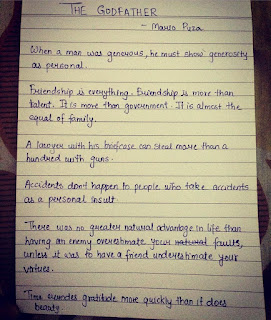My Learnings from the Book - The Godfather #Books #Reading...
Here's a look at Coppola's heavily-annotated copy of Mario Puzo's novel to give you a glimpse of the level of detail he poured into converting the Godfather book into a cinematic masterpiece:
And
since “an offer he can’t refuse” has been repeated ad nauseam in every
hacky review of Coppola's otherwise entertaining stocking stuffer, we
thought it’d be nice to shed some light on the lesser-known life (and
business!) lessons within his three-part saga,
On negotiating
“Luca
Brasi held a gun to his head and my father assured him that either his
brains or his signature would be on the contract.” -- Michael Corleone,
Book I
On health benefits
“I’d give 4 million just to be able to take a piss without it hurting.” -- Hyman Roth, Book II
On risk variables
“In Sicily, women are more dangerous than shotguns.” -- Calo, Book I
On pivoting
“I’ve lost the lust for women and now my mind is clear.” -- Don Altobello, Book III
On getting ahead in business without really dying
“If history has taught us anything, it’s that you can kill anybody.” -- Michael Corleone, Book II
On cause and effect
“You touch my sister again, I’ll kill you.” -- Sonny Corleone, Book I
On unexpected growth
“You know Michael, now that you’re so respectable, I think you’re more dangerous than ever.” -- Kay Corleone, Book III
On healthy competition
“I don’t feel like I have to wipe everyone out, Tom. Just my enemies.” -- Michael Corleone, Book II
On strategizing
“Never hate your enemies, it affects your judgment.” -- Michael Corleone, Book III
On consulting
“Never tell anyone outside the family what you are thinking again.” -- Vito Corleone, Book I
On business planning
“I don’t want anything to happen to [my brother, Fredo,] while his mother’s alive.” -- Michael Corleone, Book II
On investment goals
“And may your first child be a masculine child.” -- Luca Brasi, Book I
On life-work balance
“Don’t ask me about my business, Kay.” -- Michael Corleone, Book I




















